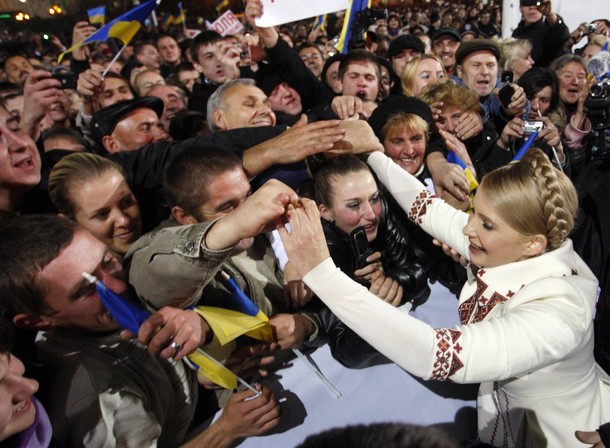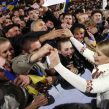
Ukrainian Presidential Candidate Yulia Tymoshenko’s Foreign Policy
Publication: Eurasia Daily Monitor Volume: 6 Issue: 211
By:

Prime Minister Yulia Tymoshenko’s 2010 presidential election program is entitled “Ukraine will be victorious. Ukraine that is you” and includes a strong emphasis on Ukraine’s integration into Europe. Tymoshenko’s election program is available, as with other registered presidential candidates, on the Central Election Commission web site (https://www.cvk.gov.ua/vp_2010/kandydaty/index.php).
Tymoshenko’s program differs from that of Viktor Yanukovych and Arseniy Yatseniuk in that it places its main emphasis upon Ukraine for undertaking the reforms needed to facilitate trans-Atlantic integration. Yanukovych and Yatseniuk follow in former President Leonid Kuchma’s tradition of pointing to Brussels, which must first send a “signal” of future membership. Kuchma, Yatseniuk and Yanukovych continue to use the argument that “Ukraine is not wanted in the E.U.,” with Yatseniuk adding NATO to the list of international organizations allegedly disinterested in Ukraine.
Tymoshenko’s election program states that, “I believe that we are capable of raising the level of European standards in democracy, human rights, standards of living, and political culture. And when we will have built Europe in Ukraine, Ukraine will become a member of the European Union” (www.vybory.tymoshenko.ua).
Speaking in Lviv to the annual World Congress of Ukrainians (SKU), the body that unites diaspora Ukrainians, Tymoshenko stressed that “Ukraine’s strategy and its future are tied to the European Union.” European integration is not only a foreign policy issue but it also concerns domestic policies. A pro-European foreign policy, Tymoshenko told the SKU, would impact upon every “sector of our life” and we need to plan to “build Europe in Ukraine.” Ukraine would “never be derailed from this direction by any obstacle,” she told the SKU (www.kmu.gov.ua, August 20).
Deputy Minister Hryhoriy Nemyria is Tymoshenko’s preferred candidate for the post of foreign minister if she wins the election. Nemyria has lobbied hard for Ukraine’s European aspirations in Brussels, Paris and Berlin, in the latter two countries enlargement fatigue and russophilism remain influential among the ruling elites. Tymoshenko and Nemyria have successfully lobbied the center-right European People’s Party (EPP), the largest political group in the European Parliament. The Fatherland Party, which is led by Tymoshenko, together with the People’s Union-Our Ukraine party, whose honorary chairman is Yushchenko, are members of the EPP.
EPP President Vilfred Martens sent a message of support to Tymoshenko at a mass rally on the Maidan on October 29 where she announced her candidacy. “Your readiness to take upon yourself this difficult decision, including a struggle with corruption, has been recognized throughout the world. You are indeed ready to lead Ukraine and to take her forward as president,” Martens said (Ukrayinska Pravda, October 29). The EPP’s orientation towards Tymoshenko has been evident over the last two years and has led to Yushchenko boycotting EPP summits or visiting EPP delegations.
Nemyria wrote in the August issue of Business Ukraine magazine that the support Ukraine had received during the global economic crisis “from E.U. member states only whets the appetite further (of Ukraine) to become a full member of the world’s largest, most stable trading block.” As with Tymoshenko, Nemyria stated that, “What is of importance is the ‘journey’ to European integration as a means to forge political consensus, stability and lasting prosperity. Today, the conversation for my team is not about potential timeframes for E.U. membership, but about the pace of reform.” Nemyria equates the “Europeanization” of the country as being synonymous with its “modernization.” The global economic crisis “has made it clearer than ever that we need more Europe, not less Europe in Ukraine,” Nemyria argued (Business Ukraine, August 2009). Nemyria differentiated the Tymoshenko team’s approach from that of Yushchenko, “they would desist from declarations of intent that were divorced from domestic policies (a reference to both Kuchma and Yushchenko’s administrations).” This, “thinking ignored the colossal challenge of aligning Ukraine’s constitutional, judicial, economic, industrial and social structures with those of E.U. member states.”
Moreover, her team’s aim to integrate “Ukraine into Europe while seeking to maintain good relations with Russia is equally distant to that pursued by Yushchenko, whose administration has poor relations with Russia, and Yanukovych’s pro-Russian program. Seeking is not the same as obtaining good relations with Russia, as seen in Prime Minister Vladimir Putin’s emotional condemnation of Tymoshenko signing of an agreement with the E.U. in March to modernize Ukraine’s gas pipelines” (Business Ukraine, August 2009). Nemyria points to three “stepping stones.” Ukraine’s membership of the World Trade Organization in May 2008, the offer of an Association Agreement made at the E.U.-Ukraine summit in Paris in September 2008 and finally, the offer of a “deep and comprehensive” Free Trade Agreement.
Tymoshenko’s program does not include any overt reference to NATO and Nemyria often refers instead to Ukraine’s desire to join the European Security and Defense Program (ESDP), which remains in a formative stage. In summer 2008 Tymoshenko was accused by Yushchenko and his secretariat of backpedaling on NATO membership in return for seeking Moscow’s backing in the 2010 elections.
Among the three main presidential candidates (Yushchenko, Tymoshenko, then Parliamentary Speaker Yatseniuk) who signed the January 2008 letter to NATO seeking a Membership Action Plan (MAP) only Yatseniuk has withdrawn his signature. Tymoshenko bloc (BYuT) deputies and domestic and foreign senior advisers to Tymoshenko include supporters of Ukraine’s NATO membership (as in Our Ukraine). Traditionally, NATO is not mentioned in any election program by even the staunchest pro-NATO political forces, such as Our Ukraine and Yushchenko in 2004. The 2010 election programs of Yushchenko, Tymoshenko and his former Defense Minister Anatoliy Grytsenko, who is also a candidate, continue this tradition by making no mention of NATO (www.cvk.gov.ua/vp_2010/kandydaty/index.php).
Tymoshenko’s 2010 program includes an oblique reference to NATO, saying that: “The joining of Ukraine to a collective security system would be decided only on the basis of a referendum” (www.vybory.tymoshenko.ua). This echoes Yushchenko’s position and would leave open the possibility of Ukraine being in a MAP indefinitely, before holding a referendum on joining the Alliance.
In surveying the three leading candidates only Tymoshenko stands on a pro-European foreign policy platform. Yatseniuk has moved away from his pro-Western orientation in 2007-2008 to a “Ukrainian third way” isolationist-nationalism, while Yanukovych offers Ukrainians a more pro-Russian version of Kuchma’s multi-vector foreign policy.




